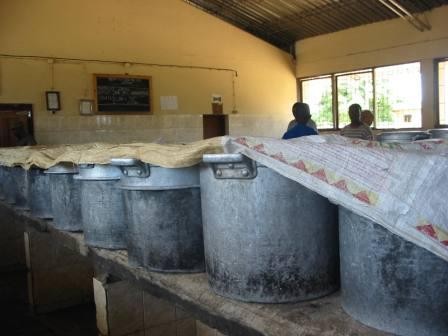Conditions improve at Maputo Central Prison
The prison currently houses 2002 prisoners, of whom 43% are pre-trial detainees (preventivos). In addition, the prison oversees the incarceration of a further 438 prisoners in the surrounding District Prisons, of whom 37% are also pre-trial detainees.
Among pre-trial detainees 69% are held in relation to “sumário-crime”, i.e. summary processes (offences punishable by less than three years’ imprisonment), while the remainder are held in relation to “querela” i.e. complaint processes. The latter are processes where there has been a complaint by a victim.
None are held in relation to “correctional police” processes (offences punishable by less than one years’ imprisonment). This suggests either that such persons are being held at police stations, or that they are not held pre-trial at all.
Most convicts “condenados” (47%) are held in relation to summary process crimes, while 27% are held in relation to complaints process crimes and 26% in relation to police correctional process crimes.
The most common crimes for both pre-trial detainees and sentenced prisoners are theft and robbery. Over the period 1 January 2013 to 12 February 2013, there were 398 admissions and 289 releases, amounting to a net increase of 100 prisoners.
The number of detainees being held pre-trial would be far lower if legal time limits were observed, as some 19% of pre-trial detainees remain detained despite the expiry of the legal term of pre-trial detention. The institutions from which these detainees’ processes emanate appear below, with the Maputo Urban District Courts accounting for the largest number of prisoners being held after the expiry of the legal term of pre-trial detention. At the time of visiting, prison management indicated that there were 34 pre-trial detainees who have been held for more than one year.
Pre-trial detainees with expired time limits, by institution, at Maputo Central, February 2013
| Provincial Prosecuotor's Office | 0 |
| Maputo City Court | 3 |
| City Prosecutor's Office | 6 |
| Maputo Urban Provincial Courts | 43 |
| Maputo Provincial Court | 58 |
| Maputo Urban District Courts | 64 |
Legal assistance provided by the Legal Aid Board, IPAJ (Instituto do Patrocínio e Assistência Jurídica), resumed operation at Maputo Central during 2012, with two judicial assistants serving the prison. They have, however, struggled with the lack of telephones and transport. Nevertheless, 368 prisoners were assisted during 2012.
The situation of overcrowding of sleeping accommodation at Maputo Central is ameliorated by the fact that prisoners are only locked up from 6pm to 6am at night; during the remainder of the time they are outside the cells but within the perimeter wall, with many engaged in constructive activities, ranging from agriculture to education.
The prison management provided a great deal of information about activities at the prison during the visit. Their records indicate that 1162 prisoners are involved in secondary education while almost a third of prisoners are involved in skilled activities such as carpentry, weaving, sewing, and metalwork.
Despite the daytime freedoms there are few escapes, with only six escapes in 2012 of whom two were recaptured.
Various types of medical treatment are available to prisoners from Monday to Friday, while mental health care is available on Thursdays. There are 416 prisoners (21%) receiving treatment for HIV and 33 receiving treatment for tuberculosis. The most common medical complaints are respiratory infections and skin infections. Tests and treatment for malaria were observed on site.
Prisoners receive two meals a day, despite the lack of budget, as the budget for prison uniforms has instead been used to maintain the diet of prisoners. The diet consists mainly of pap (maize porridge), rice, beans, nuts, and vegetables, supplemented by meat (offal) occasionally. The lunch meal is called ‘reinforced lunch’ which consists of 500g of pap instead of 250g.
 Because there are so many prisoners being held at Maputo Central, each prisoner is permitted a visitor once every fifteen days only.
Because there are so many prisoners being held at Maputo Central, each prisoner is permitted a visitor once every fifteen days only.
Despite the high number of prisoners and the relatively low number of officials on duty during any shift (30 at a time) the overall impression is of a well-managed facility. As the above statistics indicate, the prison management operates a good record keeping system, which enables proper monitoring of operational matters.

